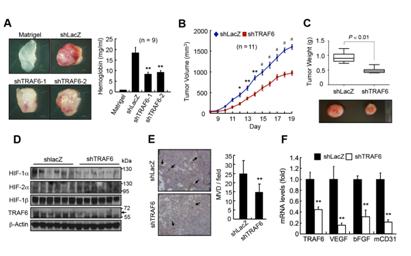TNF receptor–associated factor 6 (TRAF6) is a key activator of NF-B, playing a critical role in the regulation of innate immune responses and their connection to adaptive immune responses. Though TRAF6 has been implicated in cancer, its role in cancer has not been investigated deeply. Recently, one article published in the Cancer Research demonstrates a new function and mechanism of TRAF6 in tumorigenesis. FANG Jing, PhD, professor of the Kay Laboratory of Nutrition and Metabolism, Institute for Nutritional Sciences (INS), Shanghai Institutes for Biological Sciences and his group members found that TRAF6 upregulated expression of hypoxia-inducible factor 1(HIF–1). HIF–1 is a transcription factor and plays an important role in angiogenesis and tumorigenesis. They found that TRAF6 increased HIF-1 protein independent of oxygen. Mechanism study showed that TRAF6 bound HIF-1 and mediated its K63-linked polyubiquitination, which might prevent HIF-1 from degradation. Besides, they showed that TRAF6 promoted tumor angiogenesis and tumor growth in animal models. This study demonstrates a novel K63-linked polyubiquitination of HIF-1 by TRAF6, which widens the knowledge of post-translational modification of HIF-1. The results also reveal the function of TRAF6 in tumorigenesis, and suggest that TRAF6 may serve as an attractive target for cancer therapy. The related above results, entitled “TRAF6 Upregulates Expression of HIF-1α and Promotes Tumor Angiogenesis”, were published in Cancer Research on Aug. 1, 2013. This study was funded by grants from the National Natural Science Foundation of China, the Innovation Program of the Chinese Academy of Sciences, and Chief Scientist Program of Shanghai Institutes for Biological Sciences, Chinese Academy of Sciences. 
|

